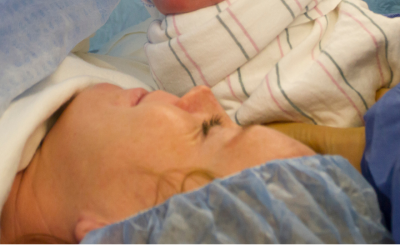
New discoveries in the blood vessels of preeclampsia survivors might help us understand future heart disease risk
The link between a history of preeclampsia and a higher risk for cardiovascular disease later in life has been reported in research now for many years. However, there are missing pieces to the story such as why and how survivors may develop cardiovascular disease. In this study, researchers were searching for possible changes to the blood vessels in women with a history of preeclampsia that had not yet developed any heart disease compared to women without a history of preeclampsia. By looking before preeclampsia survivors had developed any heart disease, the researchers were hoping to find early changes in the cardiovascular system that might be leading to or be a future cause for heart disease developing. To answer this question, the researchers studied the microvascular endothelial function (how the lining of very small blood vessels was working) in the forearms of 30 women with history of preeclampsia and 30 women without history of preeclampsia between 6 months and 5 years postpartum. The researchers were able to find specific early impairments in the microvascular function of the survivors of severe preeclampsia (systolic BP > 160 mmHg or diastolic BP > 110mmHg) only, even though they had not yet gone on to develop any vascular disease. These impairments were not seen in survivors of mild preeclampsia (systolic BP > 140mmHg or diastolic BP > 90mmHg) only severe preeclampsia survivors. This study could help researchers and doctors understand why and how survivors of severe preeclampsia are at a high risk for developing cardiovascular disease in later life.
Link: https://pubmed.ncbi.nlm.nih.gov/33481699/
About Research Roundup
Each quarter, our team of researchers reviews the most current studies related to hypertensive disorders of pregnancy and selects those studies they feel will be of greatest interest to our community to summarize.
Special thanks to our volunteer research team, who under the leadership of Dr. Elizabeth Sutton, make Research Roundup possible: Alisse Hauspurg, MD Felicia LeMoine, MD Jenny Sones, PhD, DVM, and Robin Trupp, PhD, RN.
Related Articles

Your story is needed to improve outcomes for moms like you. Add your voice to critical preeclampsia research to ensure that every story is heard.

Frequently asked questions about the Preeclampsia Registry, a patient-driven registry and biobank.

The Preeclampsia Foundation offers research funding, study recruitment, and other patient engagement services to researchers.

We provide research grant funding to advance progress towards detection, prevention, or treatment of preeclampsia, HELLP syndrome, and other hypertensive disorders of pregnancy.

Recent findings in preeclampsia research have shown that preeclampsia likely has at least two variants – an early onset and a late onset variant. Early onset is typically defined as before 34 we...

Preeclampsia is a pregnancy complication marked by new-onset high blood pressure and signs of stress on organs such as the kidneys, liver, and brain. While much attention is often given to preterm dis...

Preeclampsia is a serious problem that can happen during pregnancy. It often affects the brain and can cause headaches, vision problems, strong reflexes, and seizures (called eclampsia). In this study...

Pregnancy offers a unique window into a woman’s future heart and cardiovascular health. Conditions such as hypertensive disorders of pregnancy (HDP) which include gestational hypertension, preec...

Heart disease, also called cardiovascular disease (CVD), is becoming more common in young women across the United States. Hypertensive disorders of pregnancy (HDP) is a group of conditions that includ...


